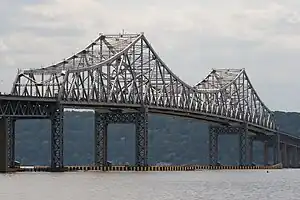Gephyrophobia
Gephyrophobia is the anxiety disorder or specific phobia characterized by the fear of bridges and tunnels. As a result, sufferers of gephyrophobia may avoid routes that will take them over bridges, or if they are a passenger, will act very apprehensively when passing over a bridge.[1][2][3] The term gephyrophobia comes from the Greek γέφυρα (gephura), meaning "bridge",[4] and φόβος (phobos), meaning "fear".[5]
| Gephyrophobia | |
|---|---|
 | |
| The old Tappan Zee Bridge (demolished in 2019 and replaced with a newer bridge) offered a service to help those with gephyrophobia cross the bridge without hesitation. | |
| Specialty | Psychology, Psychiatry, and Neurology |
Some possible manifestations of gephyrophobia may be fear of driving off the bridge, fear of a gust of wind blowing one off the bridge, or fear that the bridge will collapse when crossing it (e.g., fear that the bridge lacks structural integrity). The fear overlaps with acrophobia (the fear of heights) as gephyrophobia tends to be exacerbated in taller bridges as compared to those closer to the water or ground beneath.
Dr. Michael Liebowitz, founder of the Anxiety Disorders Clinic at the New York State Psychiatric Institute, says, "It's not an isolated phobia, but usually part of a larger constellation ... It's people who get panic attacks. You get light-headed, dizzy; your heart races. You become afraid that you'll feel trapped."[1] It is a situational phobia.[6]
As of 2008, the New York State Thruway Authority would lead gephyrophobiacs over the Tappan Zee Bridge. A driver could call the authority in advance and arrange for someone to drive their car over the bridge for them. The authority performed the service about six times a year.[1]
The Maryland Transportation Authority previously offered a similar service for crossing the Chesapeake Bay Bridge, but that role is now filled by private companies.[7]
The Mackinac Bridge Authority, which oversees the Mackinac Bridge connecting Michigan's Upper and Lower peninsulas, will drive needy gephyrophobiacs' cars across the bridge for a nominal fee.[8] Some one thousand drivers take advantage of this program annually.[9] Leslie Ann Pluhar had her Yugo blown off the bridge in 1989.[10] Later investigation concluded she had stopped her car over the open steel grating on the bridge's span and that a gust of wind blowing through the grating pushed her vehicle off the bridge,[11] but this assertion is not supported by recorded wind speed measurements taken on and around the bridge at the time of the accident.[12][13]
In media
Gephyrophobia is the main plot in "The Bridge" episode of The Middle. The character Brick is plagued by the phobia.
In 1965's A Charlie Brown Christmas, Lucy references gephyrophobia (albeit with a slight mispronunciation)[14] when attempting to diagnose Charlie Brown's problems at her psychiatric help stand.
See also
References
- Foderaro, Lisa W. (January 8, 2008). "To Gephyrophobiacs, Bridges Are a Terror". New York Times. Retrieved 2008-01-08.
Mrs. Steers, 47, suffered from a little-known disorder called gephyrophobia, a fear of bridges. And she had the misfortune of living in a region with 26 major bridges, whose heights and spans could turn an afternoon car ride into a rolling trip through a haunted house.
- "Gephyrophobia: A Fear Of Crossing Bridges. Even Before The Minnesota Collapse, Many Have Severe Phobia About Bridges". CBS News. August 10, 2007. Retrieved 2008-01-08.
The monster she fears is the Chesapeake Bay Bridge in Maryland. At four miles (6 km) long and 185 feet (56 m) high, Ayers says the thought of driving the bridge — with the way it rises straight in the air — raises a sense of panic in her.
- "Reasonable fear or bridge phobia?". USA Today. August 8, 2007. Retrieved 2008-01-08.
Jerilyn Ross, a psychotherapist and president of the Anxiety Disorder Association of America, notes that phobias are more than just being afraid of a certain object; they are marked by panic. Someone with gephyrophobia is afraid of panicking on a bridge, not necessarily the bridge itself, she says.
- γέφυρα, Henry George Liddell, Robert Scott, A Greek-English Lexicon, on Perseus
- φόβος, Henry George Liddell, Robert Scott, A Greek-English Lexicon, on Perseus
- Bragazzi1, Nicola Luigi; Del Puente, Giovanni (May 16, 2014). "A proposal for including nomophobia in the new DSM-V". Psychology Research and Behavior Management. Dove Medical Press. 7: 155–160. doi:10.2147/PRBM.S41386. PMC 4036142. PMID 24876797.
- Miller, Susan. "Don't look down: How I crossed the Bay Bridge". USA TODAY. Retrieved October 17, 2020.
- "Transport Services". Mackinac Bridge Authority. Retrieved 28 November 2022.
- Tom Carr, Record-Eagle Archived 2013-02-16 at archive.today
- Zacharias, Pat (June 6, 2000). "The Breathtaking Mackinac Bridge". The Detroit News. Archived from the original on January 21, 2013. Retrieved September 11, 2010.
- Propson, David (October 14, 2004). "How to Build a Better Bridge". New York Sun. Retrieved October 26, 2007.
- McGraw, Bill (July 8, 2007). "Mackinac Bridge Q&A". Detroit Free Press. Retrieved January 3, 2014.
- "Accident Report Claims Ms. Pluhar Was Speeding". The Argus-Press. Owosso, MI. Associated Press. November 8, 1989. p. 20. Retrieved January 3, 2014.
- "It's Not Just You, Charlie Brown : Gephyrophobia". www.merriam-webster.com. Retrieved 2019-12-06.